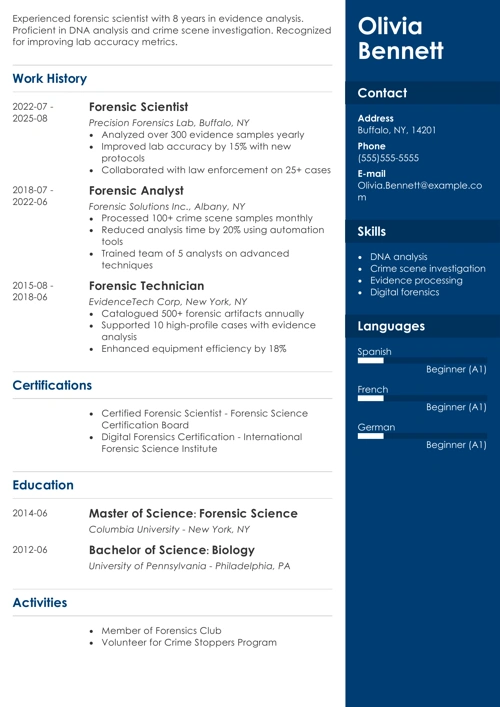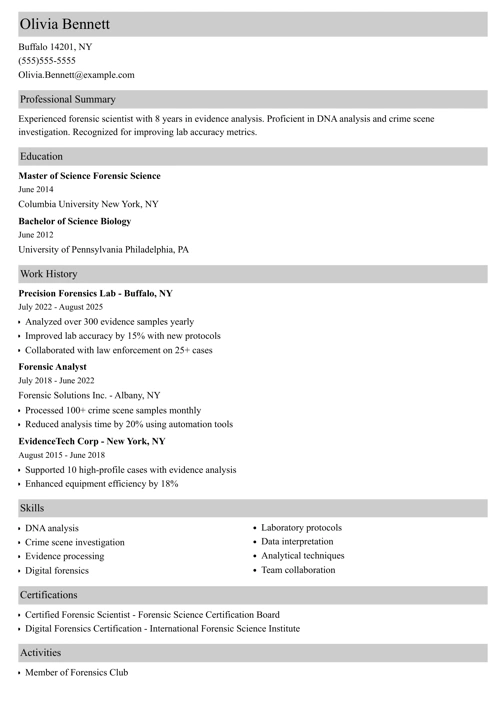Embark on the intriguing journey of forensic science, where your attention to detail and analytical skills are essential. Crafting an exceptional forensic scientist resume is your gateway to securing that dream position. This guide provides expert advice and forensic scientist resume examples to highlight your distinctive skills and qualifications. Let’s begin!
This guide will show you:
- A forensic scientist's resume example that’s better than 9 out of 10 other resumes.
- How to write a forensic scientist resume that will land you more interviews.
- Tips and examples of how to put skills and achievements on a forensic scientist's resume.
- How to describe your experience on a resume for a forensic scientist to get any job you want.
Want to save time and have your resume ready in 5 minutes? Try our resume builder. It’s fast and easy to use. Plus, you’ll get ready-made content to add with one click. See 20+ resume templates and create your resume here.
Sample resume made with our builder—See more resume examples here.
Curious to explore more resume samples? You're in the right place:
- Science Resume Example & Writing Guide
- Criminal Justice Resume Example & Writing Guide
- PhD Resume Example & Writing Guide
- Research Assistant Resume Example & Writing Guide
- Biology Resume Example & Writing Guide
- Lab Technician Resume Example & Writing Guide
- Data Scientist Resume Example & Writing Guide
- Chemistry Resume Example & Writing Guide
- Police Officer Resume Example & Writing Guide
- Resume Examples & Writing Guides for All Jobs
Forensic Scientist Resume Sample
Dr. Olivia Bennett
Forensic Scientist
(555) 234-5678
olivia.bennett@email.com
linkedin.com/in/olivia-bennett
Summary
Detail-oriented and highly analytical Forensic Scientist with 8+ years of experience conducting forensic analysis, crime scene investigations, and evidence interpretation. Skilled in DNA analysis, toxicology, and trace evidence examination. Dedicated to ensuring justice through scientific accuracy and integrity. Eager to contribute forensic expertise and laboratory proficiency to the Federal Bureau of Investigation (FBI).
Experience
Forensic Scientist
State Crime Lab, Los Angeles, CA
April 2017–February 2025
Key Qualifications & Responsibilities
- Analyzed biological, chemical, and trace evidence, preparing detailed forensic reports for law enforcement and legal proceedings.
- Performed DNA profiling, toxicology screenings, and fingerprint analysis to assist in criminal investigations.
- Collected and preserved evidence following strict chain-of-custody protocols to ensure admissibility in court.
- Testified as an expert witness in criminal trials, explaining forensic findings in a clear and concise manner.
Key Achievement:
- Developed a streamlined DNA testing protocol that reduced sample processing time by 30% while maintaining accuracy.
Forensic Lab Technician
Metro Police Department, San Diego, CA
June 2014–March 2017
Key Qualifications & Responsibilities
- Assisted forensic scientists in processing evidence, conducting chemical analyses, and preparing case reports.
- Operated and maintained forensic laboratory equipment, including spectrometers and chromatography instruments.
- Supported crime scene investigators in evidence collection and documentation.
Key Achievement:
- Improved lab efficiency by implementing a digital tracking system for evidence, reducing processing errors by 20%.
Education
Master of Science in Forensic Science
University of California, Berkeley, CA
September 2012–May 2014
Bachelor of Science in Biology
University of California, Los Angeles (UCLA), Los Angeles, CA
September 2008–May 2012
Skills
- DNA Analysis & Profiling
- Toxicology & Drug Testing
- Fingerprint & Trace Evidence Examination
- Crime Scene Investigation
- Evidence Collection & Chain of Custody
- Expert Witness Testimony
- Forensic Report Writing
- Lab Equipment Operation (GC-MS, Spectroscopy, PCR)
Certifications
- Certified Forensic Scientist, American Board of Criminalistics, 2017
- OSHA Laboratory Safety Certification, 2016
Languages
- English—Native
- Spanish—Conversational
Memberships
Member of the American Academy of Forensic Sciences since 2018
- Contributed to the development of new forensic methodologies
- Presented research findings at the annual conference in 2022
Interests
- Volunteering at local science fairs to inspire young students in forensic science
- Writing articles on forensic advancements for a personal blog with a growing readership
Here’s how to write your own forensic scientist resume:
1. Format Your Forensic Scientist Resume Correctly
Your forensic scientist resume needs a strategic design. With numerous applications for every position, you must persuade hiring managers to read your resume. How do you achieve this? A well-structured resume format that looks professional will give you an edge.
To effectively format your forensic scientist resume:
- Begin with a resume header. Include your name, phone number, email, LinkedIn, and a link to your online portfolio. These are the essential contact details on a resume.
- You may omit your street address, but mention your city if it matches the company’s location.
- Opt for a reverse-chronological resume format, which lists your most recent job first. This is the preferred resume layout as it aligns with hiring managers’ expectations.
- Select a professional font like Calibri or Arial. The ideal font size for resumes is between 10 and 12 points.
- Save your resume file as “Your Name - Forensic Scientist - Resume.pdf.” A PDF resume format is superior to MS Word as it maintains the layout.
- The recommended resume length for entry-level forensic scientists is one page. Those with significant achievements may use a two-page resume or longer.
Discover the best resume templates available in Word format: Resume Templates for Word
2. Customize Your Forensic Scientist Job Description
The Bureau of Labor Statistics projects that employment for forensic science technicians will grow by 14% between 2023 and 2033—3.5 times faster than the average for all occupations. To stand out in this rapidly growing field, highlight your analytical skills, crime scene investigation experience, and expertise in forensic technology in your work experience section.
Remember that tailoring your resume for each job is vital to grab the recruiter’s attention. A generic work experience section will not capture a recruiter's attention. Instead, dive deeper into how you excelled in your roles. When a hiring manager sees a list of generic tasks, it might reflect the position but not your unique impact.
To effectively highlight your relevant experience:
- Use the job title exactly as it appears in the job posting. This ensures your resume is ATS-friendly and aligns with specific job titles.
- Follow your employer's name and employment dates with 3–6 bullet points, prioritizing recent roles with more detail.
- Showcase your accomplishments with quantifiable data. The most impressive resume accomplishments illustrate tangible success.
- Begin each bullet with action-oriented verbs like coordinated, developed, and executed.
Forensic Scientist Resume Examples: Responsibilities
- Reconstruct crime scene events to aid law enforcement by analyzing evidence.
- Strictly adhere to protocols while collecting and safeguarding physical evidence from crime scenes.
- Conduct laboratory analyses to identify substances and match DNA profiles.
- Compile detailed forensic reports for legal proceedings.
- Act as an expert witness in court, clarifying scientific findings to juries.
- Regularly maintain and calibrate forensic equipment to ensure its precision.
- Collaborate with other specialists and agencies to solve cases.
Remember to use action verbs that convey your responsibilities and achievements effectively. Here are some action verbs for forensic scientist resumes:
Forensic Scientist Resume Examples: Action Verbs
- Led
- Coordinated
- Analyzed
- Managed
- Developed
- Supervised
- Optimized
- Designed
- Facilitated
- Executed
Get answers to your most pressing resume questions: Resume Questions
3. Make Your Education Section Count
Everyone lists their educational background on a resume, but simply stating your degree, university, and dates isn't enough. It's akin to having powerful software but only using it for basic tasks. Demonstrating how your education has equipped you with relevant skills will boost your interview opportunities.
Consider these resume tips:
- Position your degree details right after your work experience.
- For entry-level positions, highlight courses that are relevant to the job to showcase your skills.
- Even with substantial work experience, mention any fellowships, scholarships, or leadership roles you held.
- Should you include your GPA on your resume? If it's outstanding, definitely include it.
Explore rewarding job opportunities perfect for stay-at-home moms: Stay-at-Home Mom Jobs
Creating a resume with our builder is incredibly simple. Follow our step-by-step guide and use content from Certified Professional Resume Writers to have a resume ready in minutes.
When you’re done, Zety’s resume builder will score your resume and our resume checker will tell you exactly how to make it better.
4. Prove the Forensic Scientist Resume Skills the Company Wants
Presenting your capabilities on a resume is crucial, but it's important to do it the right way. Highlighting 5–10 forensic scientist skills is essential, yet randomly choosing them won't be effective. Instead, focus on the skills that the job listing emphasizes.
Here's how to incorporate forensic scientist skills into your resume:
- Skills from the job ad are key resume keywords. Integrate them into your resume's skills section.
- Avoid cramming your resume with too many skills (such as 20). This might dilute the impact of the key skills employers seek.
- To increase your interview chances, ensure these skills also appear in your work and educational accomplishments.
Forensic Scientist Resume Skills
- Evidence Analysis
- Lab Management
- Attention to Detail
- DNA Profiling
- Scientific Research
- Crime Scene Reconstruction
- Report Writing
- Chain of Custody Procedures
- Instrument Calibration
- Data Interpretation
- Communication and Collaboration
- Problem-Solving Skills
- Time Management Skills
- Critical Thinking
- Stress Management
- Teamwork Skills
- Computer Skills
- Adaptability
Stay ahead of the curve by understanding the most popular skills for your resume in 2024: Discover More
5. Add Other Sections to Your Forensic Scientist Resume
To truly stand out, your resume should reflect more than just your qualifications. Employers are also interested in your ability to mesh well with the team. Enhance your forensic scientist resume by including additional sections that showcase your unique attributes.
Here are a few sections that can showcase your capabilities:
- Include any relevant certifications you've obtained, such as certifications in forensic analysis or laboratory safety.
- If you've authored articles for scientific journals or publications, list them. Listing publications on a resume can establish your expertise in the field.
- Are you a member of professional associations like the American Academy of Forensic Sciences? Being part of such organizations highlights your commitment and involvement.
- If you've engaged in volunteer projects related to forensic science, add them to your resume. Incorporating volunteer work can demonstrate your dedication to the field.
- If you speak additional languages, include them. Knowing how to list language skills effectively can work in your favor.
Transform your resume by effectively highlighting projects that demonstrate your skills and achievements: Projects on a Resume
6. Write a Forensic Scientist Resume Summary or Resume Objective
Catch the attention of hiring managers with a strong opening statement in your forensic scientist resume. Since they might only glance at your document briefly, it's important to make those seconds count by crafting a resume introduction that effectively showcases your main qualifications.
This part, commonly known as a resume profile, provides a quick overview of your career highlights. Think of it as a succinct elevator pitch that draws attention to your most significant achievements and skills, captivating the reader in the initial moments.
If you have a minimum of one year of experience, be sure to mention it. Include your job title, how you can benefit the company, and a few notable achievements. This concise overview, known as a resume summary, should be prominently placed at the top of your resume.
If you're crafting a resume without work experience, focus on accomplishments from academic projects or internships. This approach is often termed a resume objective, where you emphasize your aspirations and potential contributions.
Elevate your job application with an effective Administrative Assistant Resume Objective that highlights your organizational prowess.
7. Write a Cover Letter for Your Forensic Scientist Resume
Are cover letters necessary? More than ever. Too many applicants these days are sending generic resumes at every job opening. It’s refreshing to see a resume come in that looks like the candidate cares about the job. A cover letter proves hat you’re interested in this company in particular.
Create your resume cover sheet like this:
- Use professional cover letter structure: with the same header as your resume and a business-ready signoff at the end.
- How to format cover letter: 3–5 paragraphs and less than a full page.
- How to begin a cover letter: job title in the first sentence and an icebreaker that makes them continue reading.
- Middle paragraphs: include a few of your biggest achievements in your resume.
- How to end it: write a cover letter conclusion that adds a few more skills and requests a conversation to discuss how you can help them.
- Finally, write an application follow-up email weekly for a month. Make it super short, and attach your resume and cover letter in PDFs.
Browse modern cover letter templates to give your application a fresh look: Modern Cover Letter Templates
Plus, a great cover letter that matches your resume will give you an advantage over other candidates. You can write it in our cover letter builder here. Here's what it may look like:
See more cover letter templates and start writing.
About Zety’s Editorial Process
This article has been reviewed by our editorial team to make sure it follows Zety's editorial guidelines. We’re committed to sharing our expertise and giving you trustworthy career advice tailored to your needs. High-quality content is what brings over 40 million readers to our site every year. But we don't stop there. Our team conducts original research to understand the job market better, and we pride ourselves on being quoted by top universities and prime media outlets from around the world.





